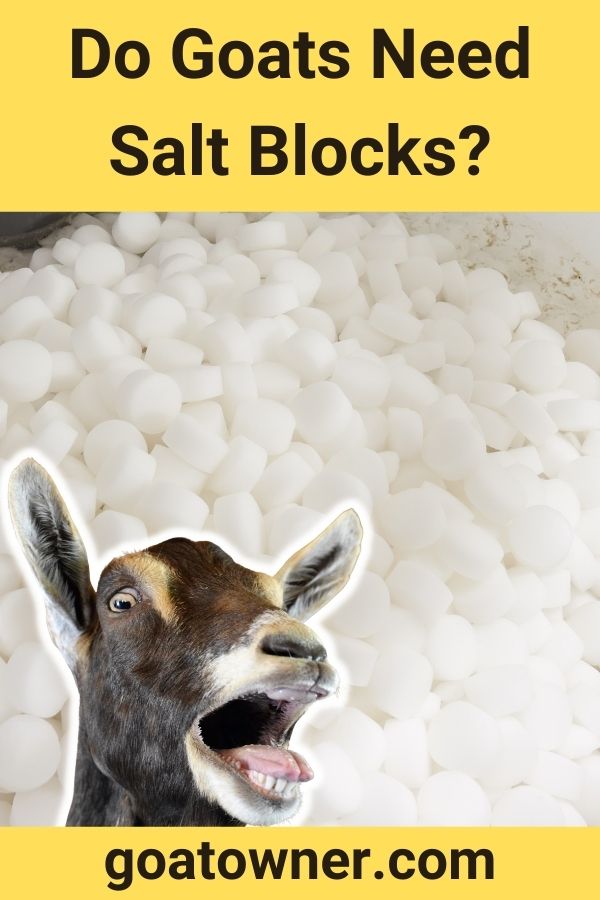I was taking a tour of my friend’s brand-new goat pasture recently.
I’ve always had goats, and he’s always been really jealous.
Now, though, he finally has the space to keep his own.
I was really happy for him and it all looks great, his goats looking very happy.
We got talking about dietary habits, and I gave him a rundown of how I tend to feed my goats on a normal week.
We shared some useful tips, but one thing that took me a bit by surprise was the salt blocks he had for them.
I’d never used them before, so I was wondering if they need them.
So, do goats need salt blocks?
They do not need one, and in fact modern dietary supplements and mineral mixes provide the necessary salt without the need for blocks. Salt supplements in a goat’s diet are advantageous, but a block is not really necessary. Further, goats’ tongues are quite soft, making blocks hard work.
Salt blocks are far from the most efficient way to get your goats the minerals they need, then.
While salt blocks have been a popular item for goat rearing, and while they do not come without benefits, there are simply better ways of getting said minerals into their diet.
Do goats need salt or mineral blocks?
The simple answer is no, they do not need a mineral block or a salt block.
However, they absolutely do need a good amount of salt and minerals in their diet, whatever kind of goat it is.
Furthermore, the answer to this question will somewhat depend on what your goat itself.
Salt blocks are most often given to milking does, since it maintains a healthy appetite and body weight and helps them produce extra milk.
This is traditionally the area they have been used.
But, again, there are plenty of supplements and loose salt feeds that are much easier and more advantageous, while providing all the same benefits.
So, no, in my opinion, goats do not need salt blocks.
This issue is something of a matter of debate, and many see the convenience of the salt block as all the advantage they need.
As I also mentioned, goats generally have a very tough time getting the minerals out of a block.
Unlike cattle, they have relatively soft mouths and teeth, and can easily hurt themselves on a mineral block.
So, why do goats need salt?
Why do goats need salt?
Salt is a really important mineral in the diet of many mammals like us and goats.
In the wild, goats will roam around for natural salt deposits to get the salt they need in their diet.
That is, unless they happen to live somewhere with a high salt diet found naturally.
Salt helps goats stay healthy, maintaining a good bodyweight overall.
Goats need to maintain their appetite, and often this will stagnate if they are deficient in salt.
The minerals in salt are also great for muscles, for the nerves, the immune system, and even reproductive health.
As I mentioned, many milking does are given extra salt blocks to support the production of milk.
As you can see, though, there is nothing in any of this to say they need a salt block.
How to get minerals in goat’s diet
The simplest way is via goat minerals.
Today, there is essentially any mineral supplement you need available easily on the market.
You will be able to find salt and mineral supplements in easily digestible forms, specifically formulated for goats.
Again, the salt your goat will need is going to depend on a few factors.
If it is a milking doe, it will need a bit more.
In any case, the rule of thumb is if you are mixing it with dry feed, you should use 0.5% of the overall dried matter volume.
Mixing it with dry feed is the easiest way to get them their salt, and they don’t stand a chance of hurting themselves on the hard blocks.
What is the best mineral block for goats?
The most commonly used are white or yellow salt blocks.
These are generally fine, and will do for a bit of salt in the goat’s diet.
However, as I said, blocks are really not the most advantageous way to give your goats salt.
If it is just pure salt, then you should have no problem mixing it in with their hay or whatever else you feed them.
Mineral blocks simply don’t offer much advantage over loose minerals and are potentially problematic in a few ways.
Why do goats lick you?
This may seem like a segue, but this is often a question I get asked.
Often, the answer is mineral deficiencies.
Especially if you’re sweaty, then your arms are rich in salt.
If your goats are deficient in salt, then they will be much keener to lick you.
If you notice this behavior, be sure to think about upping the amount of salt in their diet.
Licking isn’t always a sign of salt deficiencies, though, so like I say, carefully monitor their diet if you see this regularly.
Salt is no doubt an important part of a goat’s diet, then.
But that doesn’t mean that they need a big block.
This has been the favored method, for a variety of reasons—not least convenience.
As I have tried to argue, though, there are simply better and more efficient ways to get minerals into your goat’s diet.
Mineral blocks aren’t without advantages, but the pros are ultimately outweighed by the cons in the face of mineral supplements.

